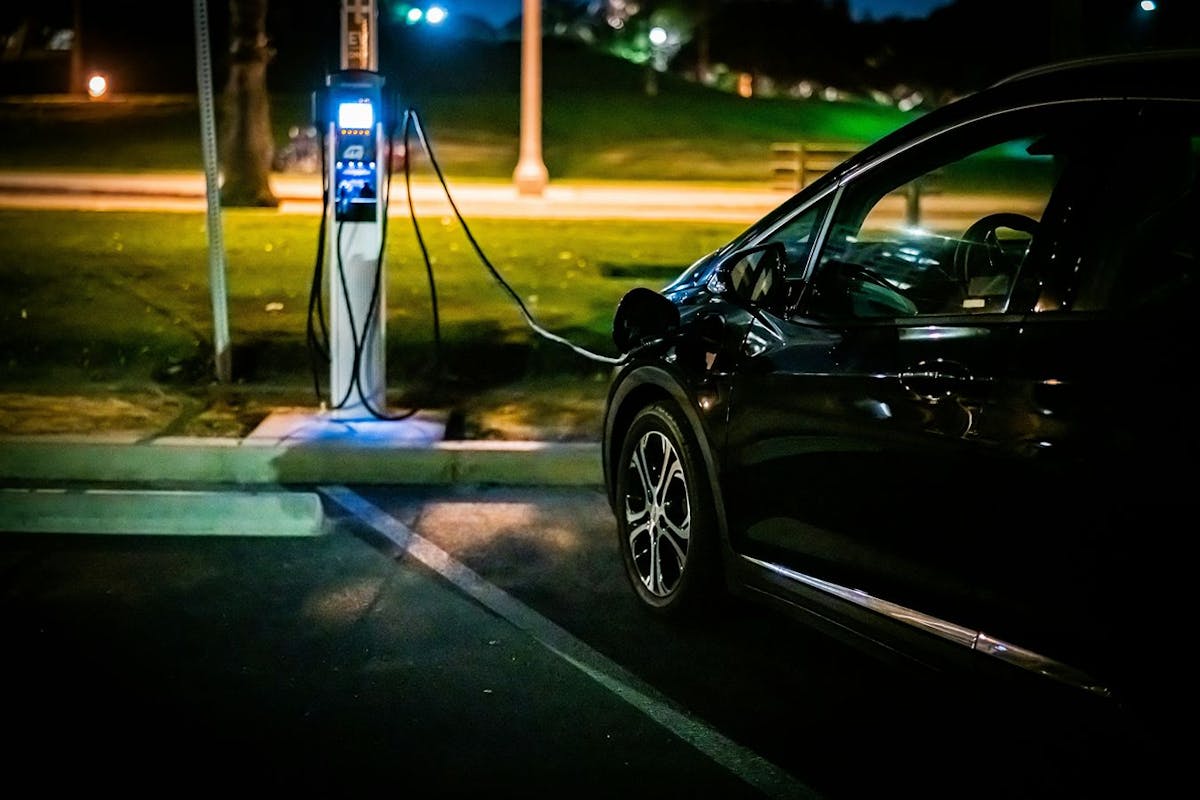How Much Does It Cost to Charge an EV? Save With These Tips and Strategies
Last edited
Author
Andrew Giermak
Solar and Electrification Writer and Editor
Editor
Andrew Blok
Electrification and Solar Writer and Editor

Americans bought 1.4 million electric vehicles in 2023 and 1.5 million EVs in 2024 according to the International Energy Agency. So, there are more drivers driving EVs, and needing to charge their EVs, than ever.
The cost of charging an electric vehicle is often less than gassing up an internal combustion-engine vehicle. But how do you make sure you’re saving money like you planned? There are ways to save money and boost the convenience of charging your EV, especially while charging it at home. Here are the ways you can charge your EV in the most economical way.
See how much you can save with home energy changes
How much does charging an electric vehicle at home cost?
The cost of charging an EV at home doesn’t come down to one number. It depends on various factors. The most important elements include your battery size and the cost of electricity in your area.
You can estimate the cost of charging an electric vehicle with some simple math. Take the price you pay for electricity and multiply it by the size of your EV battery, measured in kilowatt-hours.
So, if you live in California, where the average cost of electricity in September 2025 was 32.04 cents per kWh, and your EV battery capacity is 80 kWh, then you can expect to pay $25.63 to fully charge. However, if you charge the same car in North Carolina, where the average price of electricity was 15.12 cents per kWh, you can expect to pay $12.09 to fully charge it.
The battery size of available electric vehicles ranges from 21.3 kWh to 123 kWh, and the average cost of electricity per kWh goes from 11.95 cents in Nevada to 39.54 cents in Hawaii, leaving a potential at-home charging price range of $2.54 to $48.63.
Monthly charging costs
Conservative estimates indicate EVs get about 3-4 miles per kWh.
To calculate the monthly charge, divide the total miles you drive each month by 3 to get the kWh you utilize. Multiply that number by your price per kWh, and you’ll have a pretty good estimate of what it will cost to charge your EV monthly at your place of residence.
Say you drive 13,476 miles annually, the average for US motorists, according to the 2024 survey by the Federal Highway Administration. That's 1,123 miles a month.
Dividing by 3 miles per kWh, you get the number of kWh used per month, approximately 374 kWh.
Multiplying the 374 kWh used by the September 2025 national average electric rate of 18.07 cents per kWh, it would cost about $67.58 per month to charge your EV, if your efficiency falls at the low end of the range.
Charger expenses
While the above equation will provide an adequate cost estimate, there are other cost considerations when charging your EV battery at home. For example, Level 1 chargers are less efficient than Level 2 chargers, and they take much longer to charge (about 11-30 hours compared to 4-5 hours with a Level 2 charger), so you may benefit from installing a Level 2 charging station at your home, which can cost $200-$2,000.
On the other hand, EV owners may qualify to receive tax benefits that offset the cost of vehicles and Level 2 charging stations, bringing down the overall cost. Qualifying EV charger installations can earn owners a federal tax credit of 30% of the purchase and installation cost up to $1,000 in credit. Consult with your tax advisor before counting on the credit.
| Purchase cost | Installation cost | Charge time | Tax credit eligibility | Outlet needed | |
|---|---|---|---|---|---|
| Level 1 | Often included with the vehicle | Just need to plug into the wall. | 11-30 hours | Yes | 120 V |
| Level 2 | $400-$1,300 | $200-$2,000 | 4-5 hours | Yes | 240 V |
Cost of charging at home vs. public charging
Charging an EV at home is almost always the least expensive way to fill up, but public charging is sometimes necessary, especially on long journeys.

The number of public and private electric vehicle chargers in the US. Credit: Department of Energy
Public charging rates are typically higher than residential ones — sometimes two or three times more expensive. It’s difficult to estimate costs because the prices at stations vary. You must also consider which type of charger you need. Level 2 chargers are less expensive to use, but can take hours to fully charge. Meanwhile, Level 3 chargers can take less than an hour but are more expensive.
Luckily, there are apps and subscription services available to help EV owners make the most economical charging decisions. These services will provide maps identifying different charging areas, their services, and their prices. In general, you should expect to pay $10-$30 for a public charge.
Another, non-monetary perk of charging at home is the convenience. Recharging your EV overnight while you sleep takes a task off your to-do list. And anyone who’s ever fueled up in freezing or rainy weather can appreciate the value of such a convenience.
See how much you can save with home energy changes
Cost of charging at home vs. buying gas
Using the national gas price average provided by AAA, as of Dec. 4, 2025, the national average is $2.99 per gallon, which should take you 24 miles, if you get the gas mileage of the average American car. If you’re driving the same 1,123 miles per month as you would in your EV from the above example, you’ll pay about $140 a month in gas. (At 24 miles per gallon, you’d need about 47 gallons of fuel in a month. At $2.99, that’s about $140.)
Again, comparing the price of charging at home versus buying gas depends on multiple factors, including the cost of gas in your area, the fuel efficiency of the equivalent gas-powered vehicle, the average miles per kWh of your EV, and the cost of electricity in your state. You’ll have to crunch the numbers to determine which option is the most effective in your case.

The price of gas in the US over time. Credit: Department of Energy
The Washington Post already did some math for us and found, in pretty much all cases, charging at home is less expensive than buying gas. In states like Washington and California, the savings can be significant, while in areas like New Hampshire or Mississippi, average savings are less.
How to save when charging an EV
A major benefit of EVs is you have more space to create savings compared to a gas vehicle; although you can save one or two cents on the gallon by choosing a different gas station, you’re pretty much beholden to current gas prices. With electric vehicles, you can lower EV charging costs with some creativity. Here are some ways people are reducing their EV costs.
- Charging at off-peak times: Electricity prices can change hour by hour. If you’re on a time-of-use rate with your utility and you charge during off-peak hours (typically at night), it will be reflected in your energy bill.
- Use an EV charging electric rate: Many utilities have EV charging rate plans, which have lower rates for charging vehicles in certain time-of-use periods. Some utility companies with EV rate plans are Duke Energy in North Carolina, South Carolina, Florida, Ohio, Indiana, and Kentucky, Pacific Gas and Electric, Southern California Edison, and San Diego Gas and Electric in California, and Reliant Energy and TXU Energy in Texas. For example, Pacific Gas and Electric’s EV2-A rate charges 31 cents during nighttime off peak hours, opposed to peak rates of 50 or 62 cents.
- Use smart charge technology: Smart charging uses data to optimize your charging period. Your charger will essentially communicate between your vehicle and the utility company to control how your vehicle is charging. This lightens pressure on the power grid and can save you money.
- Use a Level 1 or Level 2 charger: If you have time to fully charge your EV using a Level 1 charger, this may be the most cost-effective. If you drive frequently, however, installing a Level 2 charger could be worth it. Either way, it will be cheaper than charging at public Level 3 chargers.
You can shop and save on Emporia EV chargers in the Palmetto app’s shop. The shop is just one feature of the app that lets you save money and save energy every day at home.
- Find free charging stations: As EVs become more popular, hotels, restaurants, and shopping outlets offer free charging stations to encourage customers to come and patronize their businesses.
- Switch to solar power: Installing solar panels in your home offers some savings opportunities, especially if you own an electric vehicle.
Solar panels and EV charging
Home solar power can reduce or eliminate your EV charging costs. Like the other cost considerations of EV charging, the amount you save by using solar energy relies on various factors. Depending on your solar system design and net metering policy, you could cover all or part of the cost of EV charging.
Some states offer tax credits for solar panels.
Pairing an EV with home solar panels will save money in most cases. The new Palmetto app lets you, for free, learn about your home’s energy usage, utility rates, and ways to save money. To get an estimate of what you can save and learn more about how to optimize the financial and environmental benefits of EVs, home solar, home electrification, and more, use our Savings Maximizer or our solar savings tool.
See what home electrification can do for you:
EV charger FAQs
Is it cheaper to charge an EV than fill a gas tank?
According to 2023 data from the Washington Post, EV owners saw savings of $14-$80 per fill-up compared to gas.
Do I need to install a charger at home if I get an EV?
Although installing a charger isn’t necessary (most electric vehicles come with a Level 1 charger, which can plug into a standard wall outlet), it might make sense for you, depending on how much you charge an EV. Level 1 chargers can take days to fully charge a vehicle, while a Level 2 charger only takes a few hours. Level 3 chargers can fully charge your EV battery within 15-30 minutes, but aren’t installed at homes.
Can I charge my car for free?
Some offices, hotels, restaurants, and shopping outlets offer free EV charging. Or, you could charge your EV with free electricity from home solar panels.
Disclaimer: This content is for educational purposes only. Palmetto does not provide tax, legal, or accounting advice. Please consult your own tax, legal, and accounting advisors.


